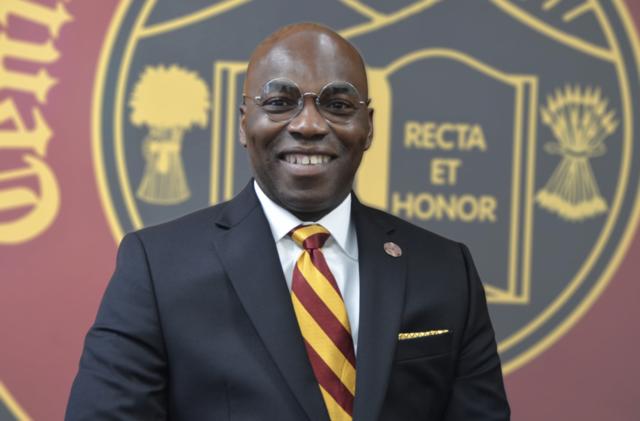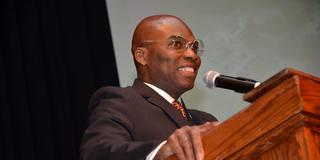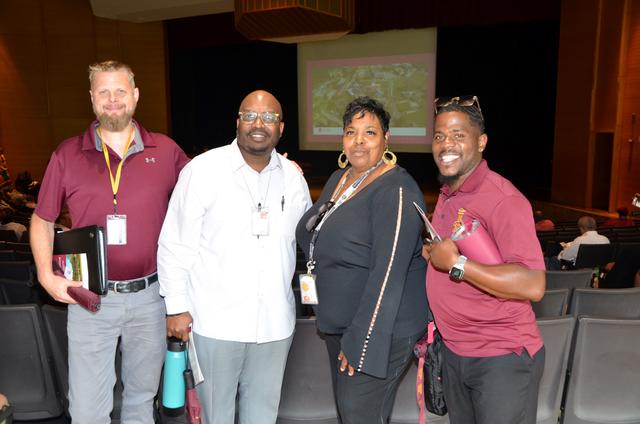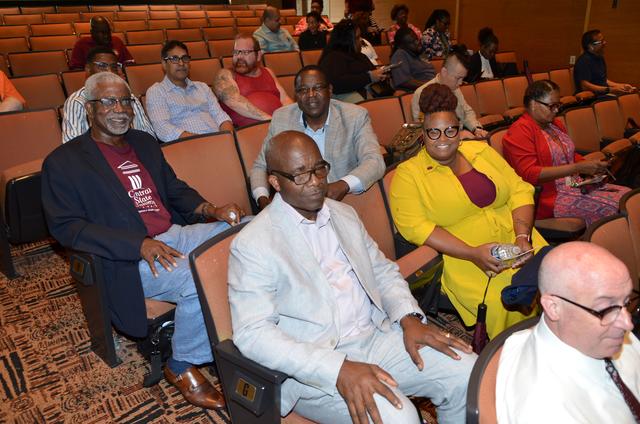
Dr. Morakinyo A.O. Kuti delivers State of the University address

The following speech was presented by Central State University President Dr. Morakinyo A.O. Kuti at the 2024-25 academic year University Institute, an annual event for faculty and staff to unite in launching the new academic year. This year’s University Institute on Aug. 8 included breakout sessions to explore four key strategies for improvement. (See related article.)

Good morning and welcome to the academic year 2024-25 University Institute. I hope you had a chance to get reenergized over the summer, whether you were gone all summer or took a few weeks off. For those of us here on campus, I hope it has been productive.
The beginning of the school year brings new excitement and possibilities for the future, and it gives us hope of what is to come when we remember the joys of last year.
I know that there were challenges during the year, but for me, the joy and the happiness and exuberance on the faces of graduates and their families at Commencement makes anything that might have happened throughout the academic year worth it.
As a former foreign student and now and now an American citizen who has been blessed to be able to travel around the world, one thing I know is that the United States of America is a destination.
The Oxford Dictionary defines “destination” as "a place to which someone is going,” or the adjective is “a place that people will make a special trip to visit.” In other words, this is a place where you intend to be. You do not get there accidentally. You choose to be there and elect to return as often as you can.
The question before us is how do we make Central State University a destination as a University? A place where people come to learn.
Merriam-Webster defines “learning” as “knowledge or skill acquired by instruction or study” or “knowledge acquired especially through formal, often advanced, school.”
As a publicly funded Institution of higher learning, especially as an HBCU and a Land-Grant Institution, how do we fulfill our vision to become a premier University in teaching, research, and extension? How do we provide meaningful learning experiences that create positive social change for anyone who comes to Central State as a destination?
We must create a space or an environment. As the Oxford Dictionary states, an environment is defined as “the surroundings or conditions in which a person ... lives or operates” or “a sum total of all the living and non-living elements and their effects that influence human life.” A more appropriate definition for our purpose as a University is, “Learning environments are places where people learn ... including physical spaces such as classrooms, residence halls, recreational spaces, or workplaces; virtual spaces such as digital platforms; or blended spaces that combine both physical and digital elements. Learning environments should provide a safe and conducive space for learning.
Our quest is to make Central State University a destination learning environment.
A destination learning environment is welcoming to all our stakeholders, including residential, commuting, and online students and their families, alumni, our Wilberforce community residents, corporate partners, other universities, farmers and small businesses, individuals seeking credentials and certificates, K-12 students and their families, community organizations seeking space or assistance, private industry, policymakers, and many others.
Though when and where people interact with Central State depends on their purpose, our main campus is the physical essence of CSU. Our physical infrastructure must be of high quality and second to none. The physical appearance and functionality of an organization is a measurement of our capacity and ability to achieve our mission. Our physical environment must facilitate and enhance the exchange of knowledge. We must remove barriers and create multiple pathways for stakeholders to engage with us, from well-functioning HVAC systems in all buildings to minor paint jobs and everything in between. Roads, sidewalks, and lawn care must be in pristine condition and accessible. These challenges are not to assign blame to anyone, especially not our hardworking facilities colleagues, but a mind shift in our priorities. I must commend the CSU Facilities Department for raising their level of performance once they understood that the change in level of expectations in preparation for new students to move in this fall. They and other supporting folks raised the standards for dorm rooms over one weekend.

You might be asking, “Why now?” Though I have been on this campus for over 30 years and observed our challenges, one’s perspective changes when you are responsible for the enterprise. As I go around campus now, I understand that it is my responsibility to make it the best it can be.
We must improve our technology to the point where it is invisible because it works so well that we cannot observe it. This means fully optimizing the use of our hardware and software. All of us must learn how to fully use the systems we have. The University leadership is responsible for providing the hardware, software, and personnel necessary to achieve our mission, but all of us must be proficient in using the systems. Effective use of technology will significantly increase our effectiveness. We must automate our processes and increase our effectiveness and efficiency.
We must increase efficiency and standards of business practices to improve customer service to internal and external stakeholders. Each office must have written standards of procedures for their services to ensure consistency with policies and procedures and guidance for their operations to continue seamlessly without dependency on individuals. This means recruitment, admissions, enrollment, registration, hiring, purchasing of goods and services, payment of vendors, and all University functions. Written protocols will allow us to identify responsibilities and allocate resources where needed. We must remove all obstacles preventing the University community, especially students, from achieving their goals.
Central State University faculty and staff are the most critical resources for the Institution to succeed. So, we will be investing resources to attract, retain, and promote outstanding people. I am excited to announce that effective Sept. 1, 2024, we are raising the annual compensation for CSU non-bargaining employees to a minimum of $41,600.
We believe that no Central State employee should earn less than $20 per hour. This is an initial step in ensuring that we offer competitive salaries to all employees, but we are starting with employees with the greatest disparities.
We are working on adjusting salaries for other employees, as well.
In response to the University community’s recommendation through the CCE (Cultural Contextual Elements) surveys and the Presidential listening sessions for a performance evaluation process that rewards hard work and excellence and addresses challenges, we will be launching an electronic evaluation tool this fall. The tool is designed to facilitate a continuous assessment of performance throughout the year.
We are also investigating efforts to add additional physical and mental health support services for students, faculty, and staff to augment the tremendous work of our staff. Establishing an environment with optimal physical, technological, processes, and personal health services are necessary for us to meet our stakeholders’ needs.

A destination learning environment fosters academic freedom and safety. Faculty and students unconcerned about their environment can truly dedicate themselves to pursuing academic excellence. Knowing that everything works as intended means that the outcomes are dependent on each person’s work ethic. A destination learning environment encourages proactive actions to ensure continued relevance and response to societal needs.
So, I am excited to announce that Dr. Fred Aikens, dean of the College of Business, Dr. Amy Hobbs Harris, interim provost and vice president for Academic Affairs, and Dr. Jose Toledo, vice president for Research and Economic Development and direct of 1890 Land-Grant Programs, will serve as co-chairs of the CSU strategic planning committee. The strategic planning process will include internal and external constituencies of the CSU family and will take several months to complete. We strongly encourage you to join the process when we start seeking volunteers shortly.
We will also launch the Office of Students Ombudsman in October to help students navigate their University journey more efficiently. Finally, our goal is to establish an Office of Graduate Programs in October to offer graduate degrees in the near future.
As I stated at the beginning of my address, America is a destination country because our country’s basic infrastructure works as it is supposed to function. Power supply is stable, food is in abundance. You can find decent accommodation and healthcare, the transportation systems work (until your flight is delayed), there is respect for civil society and rule of law, neighbors and the government generally leave you alone. These fundamental facts are why it is rare for U.S. citizens to leave the country and live elsewhere, even though it is far easier to leave the U.S. than most other countries. It is because the U.S. system is more meritorious than almost any other country in the world. The USA’s physical, technological, and social infrastructure creates a sense of belonging that keeps all here. Our quest is to make CSU a destination learning environment where people want to visit, achieve their goals, and come back as often as necessary. Our goal is to make everyone who is here want to stay to achieve their goals, make anyone who is not here want to be here, and make it easy for anyone who does not want to be here to leave.
Key takeaways
Here are the key takeaways from Dr. Morakinyo A.O. Kuti's speech at the 2024-25 academic year University Institute:
Central State University as a destination
Dr. Kuti emphasized making Central State University a "destination learning environment," a place where people actively choose to come for education and personal growth. This involves creating a welcoming and conducive environment for all stakeholders, including students, faculty, alumni, and the surrounding community.Infrastructure and physical environment
The University's physical infrastructure is vital in achieving its mission. Dr. Kuti stressed the importance of maintaining high-quality facilities, from well-functioning HVAC systems to pristine roads and sidewalks. He praised the Facilities Department for their recent efforts to raise standards, particularly in preparing dorm rooms for incoming students.Technology optimization
Dr. Kuti called for the full optimization of the University's technology, aiming for it to work so seamlessly that it becomes "invisible." This requires everyone to be proficient in using the available hardware and software, which will enhance the University's effectiveness and efficiency.Business practices and efficiency
Improving the efficiency and standards of business practices is crucial for better customer service to both internal and external stakeholders. Dr. Kuti highlighted the need for written standards of procedures in every office to ensure consistency, continuity, and the removal of obstacles that prevent the university community from achieving their goals.Investment in faculty and staff
CSU plans to invest in attracting, retaining, and promoting outstanding faculty and staff. Effective Sept. 1, 2024, the University will raise the annual compensation for non-bargaining employees to a minimum of $41,600, ensuring that no Central State employee earns less than $20 per hour. This is part of a broader effort to offer competitive salaries across the University.Performance evaluation and health support services
In response to community feedback, Central State will launch an electronic performance evaluation tool to facilitate continuous assessment. Additionally, the University is exploring ways to enhance physical and mental health support services for students, faculty, and staff.Strategic planning and new initiatives
Dr. Kuti announced the formation of a strategic planning committee co-chaired by key University leaders, which will include internal and external constituencies. He also shared plans to launch an Office of Students Ombudsman and an Office of Graduate Programs in October, aiming to improve student support and expand academic offerings.Vision for the future
The overarching goal is to make Central State a place where people want to visit, achieve their goals, and return, like how the U.S. is viewed as a destination country. Dr. Kuti expressed a commitment to creating an environment where stakeholders feel a sense of belonging and are empowered to succeed.


